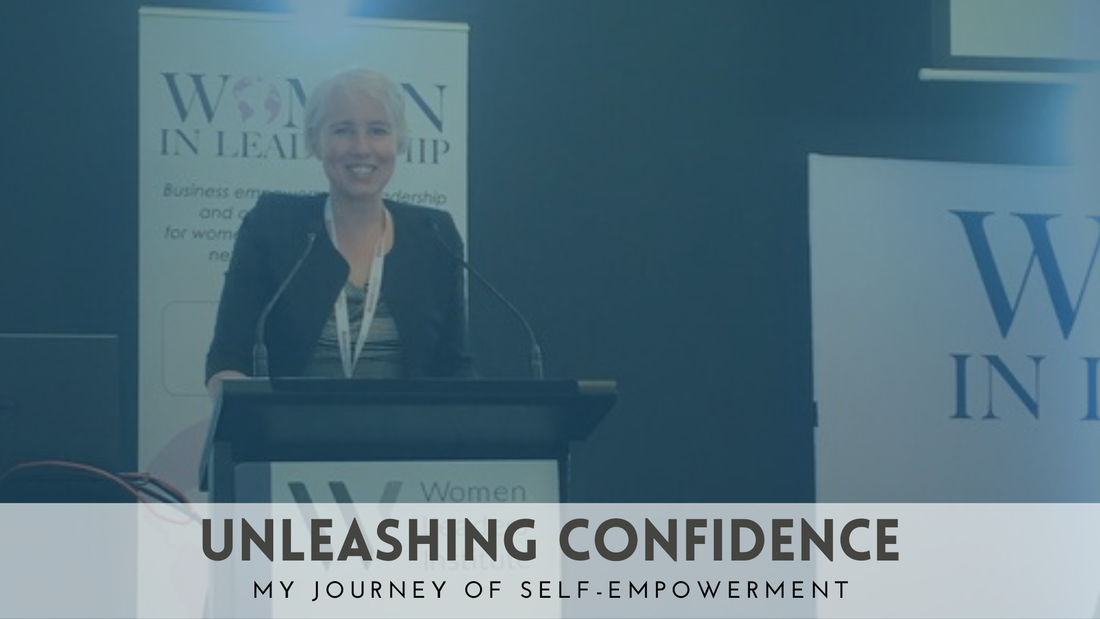Contributed by: Georgia Ellis My Personal Journey of Self-Empowerment In my current and previous roles as a leader, coach, and facilitator, I've discovered that confidence isn't just a trait; it's a mindset that can be cultivated and honed over time. Recently I facilitated management/leadership training for a group of predominantly male, blue-collar managers, the group was a mix of office-based managers and workshop managers who managed skilled fabricators. Most in the room had never had any form of management or leadership training before and I was a little apprehensive around the reception I’d receive. We got off to a flying start, a little bit of humour and storytelling goes a long way to making those not used to being boxed up in a small conference room for a full day feel at ease. We finally made it to the morning tea break when a male participant mentioned that he was really good at reading people, so I challenged him by asking “What’s your read on me?” his reply “ I can tell you have a lot of self-confidence, the way you handled a room of what I would consider a difficult audience and had everyone contributing withing the first 30 minutes shows both that you are passionate about what you do and you know your stuff”. It was a lovely compliment, and put me further at ease for the rest of the day… but it also got me thinking… I wasn’t always this way… I hadn't always exuded confidence... what had I done that allowed me to display an air of confidence that was clearly noticeable by other people? Upon reflection I realised that my journey towards greater confidence began with a simple yet powerful approach that accelerated my progress: flooding my subconscious with a vision of the person I aspired to be. Through mental and physical rehearsal, I ingrained confidence into my very being until it became second nature. Drawing on my intrigue into human potential and the knowledge I had gained over 20+ years deep diving how to harness our mind, in particular the subconscious aspect of our mind that drives up to 95% of our results. I had gathered and tested various approaches that allowed me to retrain my subconscious mind. My journey lead me to the discoveries in neuroscience, psychology and even some ancient wisdom, all telling the story of the part of us that we have come to know as our 'default network' and how we can use the 5% of our mind to consciously make changes to our outdated programming, beliefs and ideas. I then took what I had learned and applied it to my own life, I created a new identity - one that oozed confidence. This is what I did, and if you feel you could do with a bit of a confidence top up, I invite you to experiment with the ideas in your own life. Tip 1: Immerse Yourself in Your Vision: I flooded my mind with images of myself as a confident, assertive woman. Visualising success in various scenarios helped reshape my subconscious beliefs about my abilities. Tip 2: Prepare and Rehearse: Confidence grows when we confront our fears head-on. By gathering information, planning my approach, and mentally rehearsing before challenging situations, I pre-emptively tackled doubts and uncertainties. Tip 3: Practice, Practice, Practice: Whether it's mastering a new skill or navigating difficult conversations, consistent practice breeds confidence. (I rehearsed everything even my new identity) I embraced every opportunity to step out of my comfort zone, knowing that each experience contributed to my growth as a leader. How did I know it worked?
Applying these principles proved that confidence isn't an innate trait reserved for a select few; it's a mindset that can be cultivated through deliberate effort and perseverance. Yes we can change our identity and confidently step out of the self-imposed boxes we find ourselves in. If I can do it, you can too... but it takes effort! Change is not passive! So, I invite you to embrace the power of visualisation, preparation, and practice to unlock your full potential, to step out with greater confidence and be a positive role model in our ever-changing world. Remember: Confidence isn't just a destination—it's a journey of self-discovery and empowerment and changing who you are starts by changing how you think – the thinking parts the easy bit! Contributed by Layla Wyatt Future Market Insights asserts that the Australian leadership development program market has a projected CAGR of 8.9% from 2023 to 2033. Notably, technology-driven learning methods are increasingly adopted within leadership development programs. "Leadership is not merely giving orders; it's about inspiring, guiding, and adapting to the future. Embrace technology-driven learning to cultivate extraordinary leaders," says business expert Olivia Jones of Askfunding.– Australia's top loan and financial provider. Leadership isn't just about giving orders and making decisions; it's about inspiring, motivating, and guiding the team toward success. Dive into how coaching and professional development programs can turn ordinary leaders into extraordinary ones. 1. Developing Soft Skills with a Smile Coaching programs often focus on soft skills like empathy, active listening, and emotional intelligence. It's like the chocolate chips in the leadership cookie—they make the whole experience sweeter! Coaching helps to understand your team's needs and motivations, fostering a positive work environment. It builds trust among members and a sense of belongingness 2. Boosting Self-Awareness Coaching programs often include self-assessment tools and exercises to help you better understand your strengths, weaknesses, and blind spots. It's like having a mirror that reflects your leadership persona to you. It leads to confidence, more informed decisions, a tailored leadership style, and realistic goals. It's like upgrading your leadership armor to withstand any challenge! 3. A Playbook For Success Professional development programs help leaders develop a deeper understanding of their roles through workshops, seminars, and interactive sessions. It's like attending an action-packed boot camp where you hone your leadership skills, and instead of push-ups, you do problem-solving exercises. Life Reloaded, Superior Thinkers Toolbox, and Future Ready Leaders Toolkit are programs that can upgrade your leadership skills. Whether mastering new technology, understanding market dynamics, or refining your project management skills, these programs turn you into a leader who's always ahead of the game. 4. Highlights The Value Of Feedback Coaching empowers leaders by offering a safe space for self-reflection, feedback, and goal setting. It's a two-way street where a team can grow together. Through open dialogue and constructive criticism, coaches help leaders identify strengths and weaknesses and enhance their skills. They also hold you responsible for your commitments and track your progress. 5. Playful Experimentation And Innovation Professional development programs often encourage you to step out of your comfort zone and try new things. It's like having a laboratory where you can conduct playful experiments in your leadership approach. By exploring fresh ideas and taking calculated risks, you'll discover innovative solutions to old problems. It's like inventing your leadership magic! 6. Building A Support Network Coaching and professional development programs introduce you to a network of like-minded individuals. It's like joining an exclusive club where you can exchange ideas, experiences, and support, helping you tackle challenges with newfound confidence. Refine Your Leadership Style With Blue Chip Minds Coaching and professional development programs are the unsung heroes in the world of leadership.
A powerful ripple effect arises as leaders become empowered through coaching and professional development programs. Like a stone thrown into a pond, the impact goes far beyond the initial point of contact. Blue Chip Minds is an organisation dedicated to cultivating the talents of young minds and helping them thrive in the world of technology, science, and entrepreneurship. We help individuals develop essential skills and knowledge to become future leaders! Contact us to learn about Australia’s top global professional development solutions provider. |
Authors
Our Contributors are a mix of passionate and switched on Humans ready to share their, career, business, well-being, leadership and performance insights with you so you can be the architect of your own extraordinary future! Archives
May 2024
Categories
All
|
Global professional development solutions for individuals and organisations.
Working with Individuals and organisations in;
Australia | Singapore | Hong Kong | United States | India | United Kingdom | Dubai | China | Poland
Malaysia | New Zealand | Japan | Belgium | Austria | South Africa | Brazil | Canada
Working with Individuals and organisations in;
Australia | Singapore | Hong Kong | United States | India | United Kingdom | Dubai | China | Poland
Malaysia | New Zealand | Japan | Belgium | Austria | South Africa | Brazil | Canada
|
We acknowledge the Traditional Custodians of the land on which we live, work, meet and play. This most often is the Wurundjeri people. We pay our respects to Elders past, present and emerging of the Kulin Nation. We extend gratitude and respect to Aboriginal and Torres Strait Islander peoples and global indigenous cultures for their incredible wisdom, resilience, deep connection to the natural environment and their deeply transformative spiritual practices.
We have so much more to learn from you. |
Copyright © All Rights Reserved BLUE CHIP MINDS 2013 - 2021



 RSS Feed
RSS Feed
